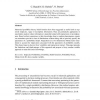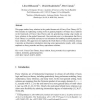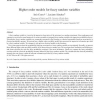FSS
2008
13 years 4 months ago
2008
Numerical possibility theory, belief function have been suggested as useful tools to represent imprecise, vague or incomplete information. They are particularly appropriate in unc...
FSS
2008
13 years 4 months ago
2008
In this paper we propose a generic methodology for the automated generation of fuzzy models. The methodology is realized in three stages. Initially, a crisp model is created and i...
FSS
2008
13 years 4 months ago
2008
In the last decade defeasible argumentation frameworks have evolved to become a sound setting to formalize commonsense, qualitative reasoning. The logic programming paradigm has s...
FSS
2008
13 years 4 months ago
2008
In this paper, we introduce triangle algebras: a variety of residuated lattices equipped with approximation operators, and with a third angular point u, different from 0
FSS
2008
13 years 4 months ago
2008
Multidimensional databases are now recognized as being the standard way to store aggregated and historized data. Multidimensional databases are designed to store information on me...
FSS
2008
13 years 4 months ago
2008
In this work we give a state-of-the-art review of two of the most established classes of fuzzy implications, viz., (S, N)- and R-implications. Firstly, we discuss their properties...
FSS
2008
13 years 4 months ago
2008
The grade of membership (GoM) model uses fuzzy sets as memberships of each individual to extreme profiles (or classes) on the likelihood function of multivariate multinomial distr...
FSS
2008
13 years 4 months ago
2008
This paper studies fuzzy relations in the graded framework of Fuzzy Class Theory (FCT). This includes (i) rephrasing existing work on graded properties of binary fuzzy relations i...
FSS
2008
13 years 4 months ago
2008
A fuzzy random variable is viewed as the imprecise observation of the outcomes in a random experiment. Since randomness and vagueness coexist in the same framework, it seems reaso...
FSS
2008
13 years 4 months ago
2008



